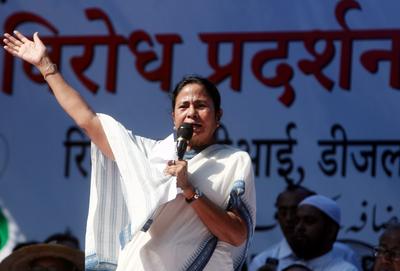The government was saved from being reduced to a minority by the support of the Samajwadi Party (SP). But the SP, as well as another coalition partner, the Dravida Munnetra Kazhagam, has made it clear that it does not favour FDI in retail operations.
The Congress will now have to navigate its remaining term with allies who will demand reparations for extending vital support. So the next parliamentary elections to the parliament might be forced on the country sooner than 2014 if the Congress’s current allies decide to follow in Mamata Banerjee’s footsteps.
Why did the Congress announce the policies despite knowing the political costs? India’s economic slowdown was clearly a major factor. After moderate GDP growth of 5.3 per cent and 5.5 per cent in two successive quarters, and 0.1 per cent growth in industrial production in July 2012, India’s economic outlook was bleak. There were serious concerns over rating agencies downgrading the economy to ‘junk’ bond status given the slowdown and the government’s inability to make any major economic decisions. The situation could not have been salvaged without kick-starting economic reforms. Low growth and poor economic conditions were good excuses for taking politically unpopular measures.
Another factor that prompted the reforms was the almost complete erosion of the government’s credibility. The last couple of years have seen the government announcing several decisions only to take them back under political pressure, leading commentators to suggest that India is suffering from ‘policy paralysis’. In addition, there have been a series of corruption charges levelled against the government. The latest ‘Coalgate’ scandal over allocation of private mining rights of coalfields and the shadow it cast on the prime minister has been a blow for the beleaguered government. Measures aiming to produce an economic turnaround would not only restore investor confidence in the economy, but would also deflect attention from the scandals and recover some precious goodwill. While the Congress will have to defend the corruption charges all the way up to the next elections, a robust economic story can provide it some much-needed triumphs.
The government certainly calculated the political costs of the policies before announcing them. It decided to take the gamble on the assumption that most parties would not want sudden elections and therefore would not risk destabilising the government. The support the SP quickly extended and the possibility of further support from the Bahujan Samaj Party (BSP) vindicates the government’s assumption.
The Congress is likely to capitalise on the reluctance of its allies to have early elections by announcing more economic reforms in the coming months. It will also try to politically isolate Mamata Banerjee on the issue of FDI in retail operations. The Congress in West Bengal has already begun preaching the virtues of foreign retailers. With most of the Congress-ruled states supporting the move, the government will defend the reforms by projecting them as a vital step for removing intermediaries and tackling supply-side inflation.
While the stock market has risen to a seven-month high after the reforms were announced, maintaining the momentum will require continuing work. The economic agenda has a lot of pending items. Several pieces of important legislation are stuck in the Parliament, including bills on land acquisition, mining and higher education. These bills have not been passed due to the government’s inability to muster political support for their passage.
The biggest test for the Congress in the coming months will be to push through these pieces of legislation. It will also need to make several tough decisions to tackle the worrying fiscal situation, and the next few months provide the only opportunity for doing so. As the time for the Union Budget draws near, demands within the Congress party for announcing populist measures in view of the forthcoming elections will increase. The government has precious little time to get its act together.
Amitendu Palit is Head (Partnership & Programmes) and Visiting Senior Research Fellow in the Institute of South Asian Studies in the National University of Singapore.

